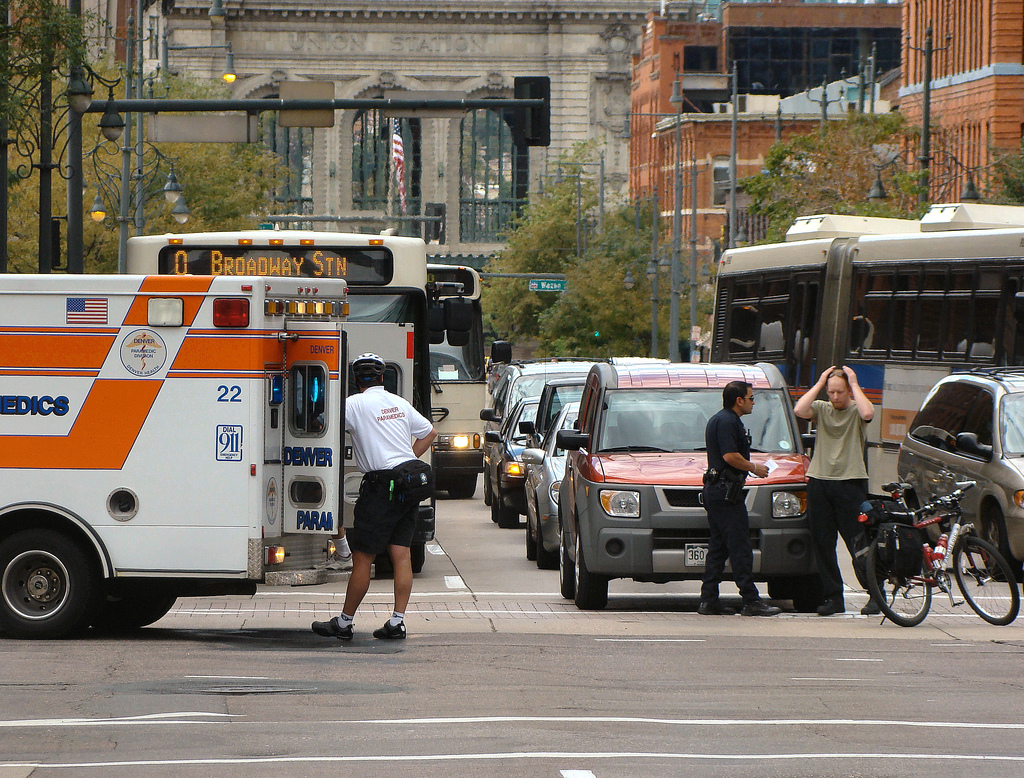Denver Business Journal’s Westergaard: Bikeable Streets Are Hostile to Cars

Denver Business Journal editor Neil Westergaard has gone all in on his war against people on bikes — traffic congestion and local businesses be damned.
Today Westergaard published his latest rant, which calls the city’s plan to make biking safer “vehicle-hostile” and paints people who want a convenient way from A to B as “fanatics” who think they’re “morally superior.” This latest gem comes from the same guy who whiffed on the basic economics of parking and who believes bicycle infrastructure is a conspiracy against drivers.
Writes Westergaard:
In case you missed it, the city of Denver and the state of Colorado are jumping on the bicycle bandwagon in a big way. It’s an active movement that’s been going on for years in the city, advanced by city planners and bicycle advocates, to move people out of their cars and pickup trucks and onto two wheels as quickly as possible for the good of the earth and all humankind.
The most devout of the bicycle acolytes argue that putting in more protected bicycle lanes, at the expense of motorized-vehicle lanes, will actually reduce overall traffic congestion. Their reasoning? When cities make bicycling safer, more people will choose to get around on two wheels instead of by automobile, thus reducing the number of cars on the road.
Westergaard mocks that idea, citing Boulder’s Folsom Street protected bike lane experiment. But that experiment didn’t fail — it didn’t even have enough time to fail. The City Council caved to complaints 10 months early, before significant traffic data could be collected.
On the other hand, the Denver Business Journal publishes an article nearly every day about the city’s rapid growth. Five hundred new apartments here. The rise of Millennials there. But you have to wonder if Westergaard understands what will happen if the city keeps growing without adding transportation options to its streets. It will choke — like Los Angeles — and traffic will be worse than it is now.
More from Westergaard’s piece, this time about the protected bike lane planned for Broadway:
Forcing bike lanes onto one of the most heavily traveled thoroughfares in Denver is not just being friendly to bicycles. It’s being vehicle-hostile and totally unnecessary, in my opinion.
There are plenty of routes upon which protected bike lanes can and should be established that wouldn’t stick it to people who choose to drive. But the bike fanatics won’t hear of it. They view protected bike lanes on established automobile thoroughfares as an inalienable right and morally superior to driving — many of them believe — because it doesn’t require the burning of fossil fuels.
Westergaard’s own publication reported that Millennials, the fastest growing age demographic in Colorado, prefer not to drive to work. Yet he uses the term “established automobile thoroughfares” as if streets shouldn’t change with the times.
Any credibility he had ends with the premise that streets belong to any one type of traveler. Streets are public spaces that belong to everybody. They’re not about who that space is for, but how that space is used, and Broadway is used as a one-dimensional speedway for motorists leaving the city. The street marginalizes the people who use it as a connection to transit, families who live there, consumers who spend money there, and the businesses they support.
Speaking of business, is the leader of Denver’s preeminent business publication up to date on how making streets more appealing for people outside of cars helps commercial streets function better?
Take Larimer Street, where the addition of bike lanes coincided with a huge spike in retail sales. Or Broadway, Westergaard’s favorite example, where the Broadway Merchants Association helped pull off the three-day bike lane demo last month. A survey of 114 people walking or biking by the demo revealed the following:
- 78 percent said they would spend more money on Broadway if the bike lane were permanent.
- 68 percent said they would use the bike lane either daily or weekly if it were permanent.
- 68 percent own cars.
Instead of thinking about Denver’s streets critically, Westergaard pits people who bike against people who drive, even though they’re often one and the same. Our streets are not a cultural battleground as he would have you believe. They’re public spaces that should get everyone where they need to go safely and efficiently. Right now, that’s not happening.
Westergaard’s publication has a significant following, and his column urges readers to email the Denver Public Works project manager to weigh in. Streetsblog Denver suggests the same.


